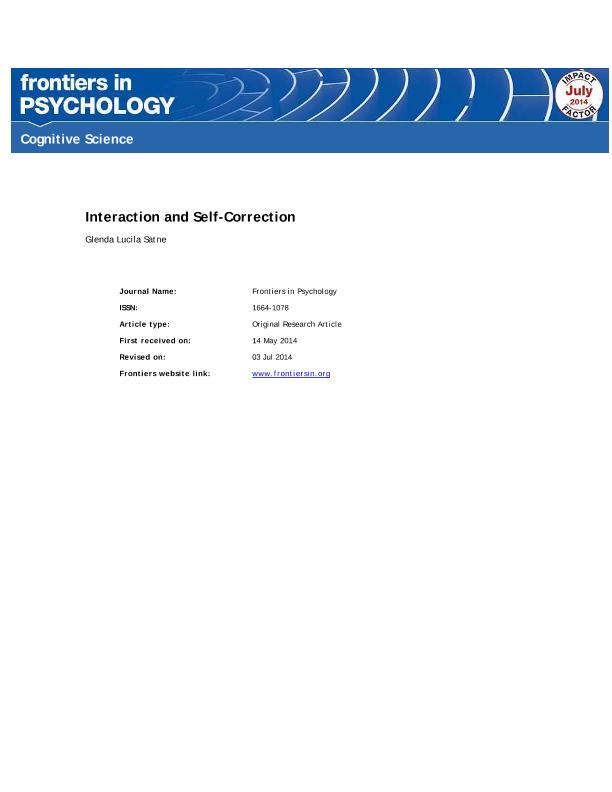Mostrar el registro sencillo del ítem
dc.contributor.author
Satne, Glenda Lucila

dc.date.available
2018-02-06T19:42:33Z
dc.date.issued
2014-07
dc.identifier.citation
Satne, Glenda Lucila; Interaction and self-correction; Frontiers; Frontiers in Psychology; 5; 7-2014; 1-11
dc.identifier.issn
1664-1078
dc.identifier.uri
http://hdl.handle.net/11336/35869
dc.description.abstract
In this paper I address the question of how to account for the normative dimension involved in conceptual competence in a naturalistic framework. First, I present what I call the Naturalist Challenge (NC), referring to both the phylogenetic and ontogenetic dimensions of conceptual possession and acquisition. I then criticize two models that have been dominant in thinking about conceptual competence, the interpretationist and the causalist models. Both fail to meet NC, by failing to account for the abilities involved in conceptual self-correction. I then offer an alternative account of self-correction that I develop with the help of the interactionist theory of mutual understanding arising from recent developments in Phenomenology and Developmental Psychology.
dc.format
application/pdf
dc.language.iso
eng
dc.publisher
Frontiers

dc.rights
info:eu-repo/semantics/openAccess
dc.rights.uri
https://creativecommons.org/licenses/by/2.5/ar/
dc.subject
Interaction
dc.subject
Normativity
dc.subject
Self-Correction
dc.subject
Naturalism
dc.subject
Evolution
dc.subject
Conceptual Abilities
dc.subject.classification
Estudios Religiosos

dc.subject.classification
Filosofía, Ética y Religión

dc.subject.classification
HUMANIDADES

dc.title
Interaction and self-correction
dc.type
info:eu-repo/semantics/article
dc.type
info:ar-repo/semantics/artículo
dc.type
info:eu-repo/semantics/publishedVersion
dc.date.updated
2018-02-05T20:16:24Z
dc.journal.volume
5
dc.journal.pagination
1-11
dc.journal.pais
Suiza

dc.journal.ciudad
Lausana
dc.description.fil
Fil: Satne, Glenda Lucila. Consejo Nacional de Investigaciones Científicas y Técnicas; Argentina. Universidad de Copenhagen; Dinamarca
dc.journal.title
Frontiers in Psychology
dc.relation.alternativeid
info:eu-repo/semantics/altIdentifier/doi/http://dx.doi.org/10.3389/fpsyg.2014.00798
dc.relation.alternativeid
info:eu-repo/semantics/altIdentifier/url/https://www.frontiersin.org/articles/10.3389/fpsyg.2014.00798/full
Archivos asociados
